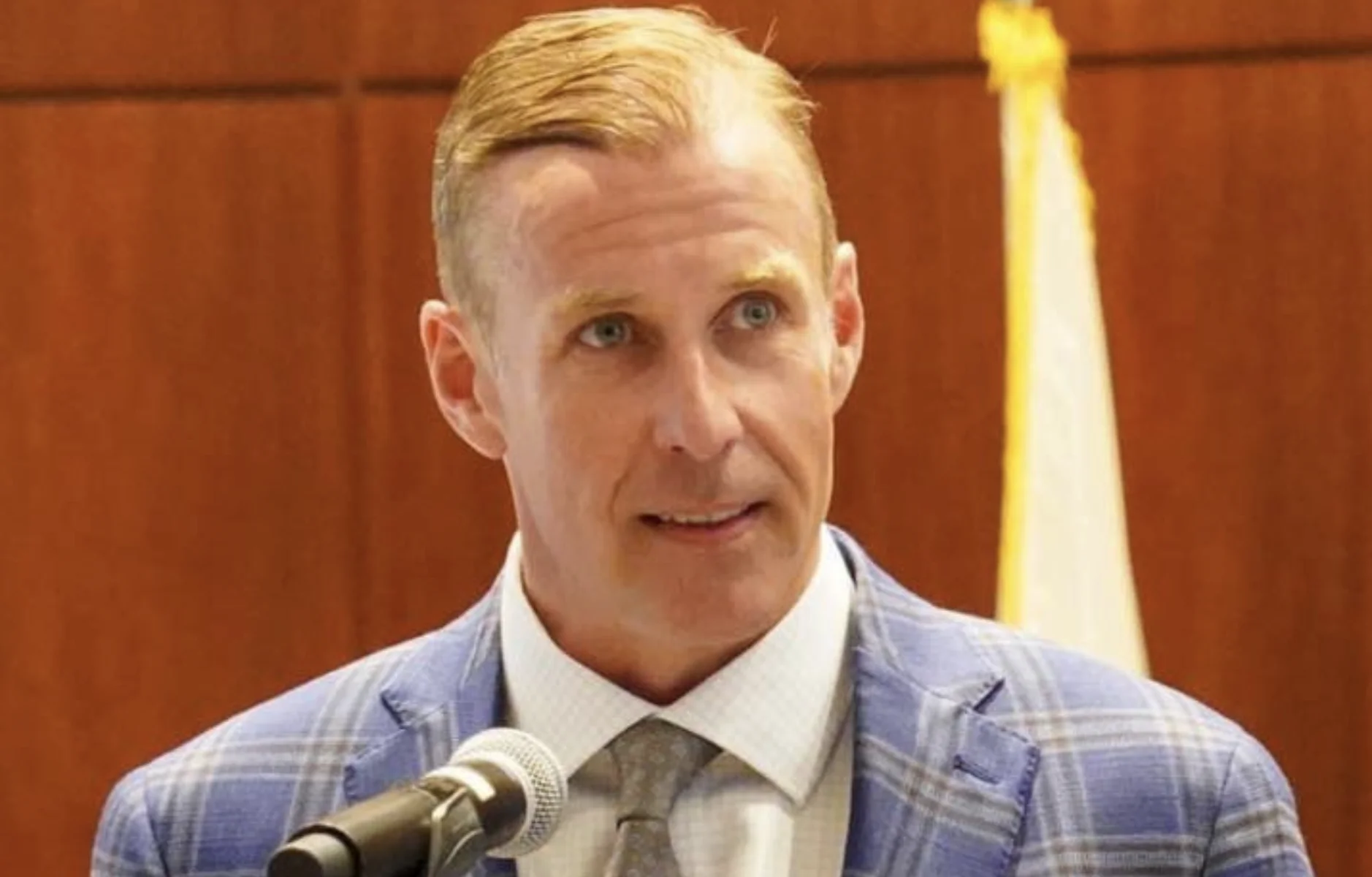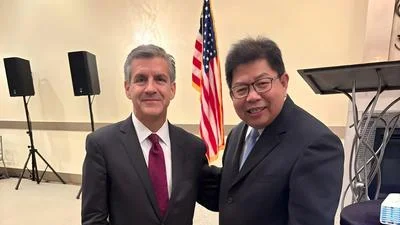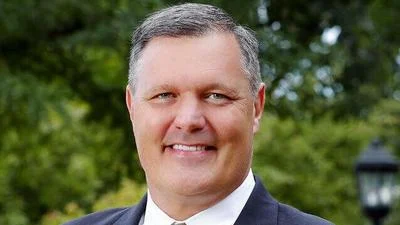Naperville City Councilman Josh McBroom. | Facebook / Josh McBroom Naperville City Council
Naperville City Councilman Josh McBroom. | Facebook / Josh McBroom Naperville City Council
Naperville City Councilman Josh McBroom is speaking out against District 203 school board member Marc Willensky’s involvement in the City Council’s upcoming decision on whether to renew Naperville’s power contract with the Illinois Municipal Electric Agency (IMEA).
McBroom pointed to District 203’s recent vote urging the City Council to reject the IMEA contract renewal, calling it “unprecedented” and a clear overstep.
“It was very unusual that the school board would make a statement,” McBroom told the DuPage Policy Journal. “They voted on a position statement to urge the City Council to vote ‘no’ on the IMEA renewal contract. I would call it unprecedented that any local government body would weigh in on another local government body's policymaking decisions.”
Willensky played a leading role in the board’s unanimous decision to oppose Naperville's renewal of its electricity contract with IMEA, citing the urgency of climate action—a move McBrook says is a conflict of interest.
“I think he's 100% conflicted. If you read his quote in the paper, in his comments it was all about the kids. The kids are worried about the climate,” he said.
“Well, first of all, if you had any basic understanding of the offering, you would see that this is a move towards clean energy. So clearly you haven't researched the topic, but don't tell me this is about the kids. When I see that you're on, you're deeply involved with local environmental activists who are actively lobbying at the city council on this policy, and then you advance on your school board a position to the city that we should not renew—give me a break.”
In comments at District 203’s Aug. 4 board meeting, Willensky emphasized the board’s responsibility to reflect students' environmental concerns.
“They understand the climate science,” Willensky said, according to the Naperville Sun. “They look at the world around them and they see the fires and the floods and they know that climate change is real and we all need to do our part.”
However, Willensky did not note in his comments that he is treasurer of Accelerated Climate Solutions, a nonprofit with ties to local activist group NEST, an outspoken opponent of the IMEA contract.
McBroom, in a recent Facebook post titled “Let’s Talk Transparency,” questioned whether Willensky’s school board advocacy was truly about student voice or instead politically driven. He ended the post with: “P.S. Have you made any progress on the teachers contract? Clock is ticking.”
At issue is whether Naperville should extend its decades-long membership in IMEA, a nonprofit energy cooperative that supplies power to 32 municipalities in Illinois. Naperville, the largest user, faces an August 19 deadline to renew, coinciding with the next scheduled City Council meeting.
Until recently, no vote had been scheduled, McBroom noted, and he had to push for one in a council meeting in July.
“I actually got overwhelming support to vote for it, to vote on it – not vote for – but to vote on it,” he said. “I think we were to the point where it would have been very hard for people on the city council to say no to a vote.”
The timing is critical.
Naperville currently pays 20–32% less than ComEd customers, saving the city $32 million annually.
IMEA also allows for potential 25% rate cuts after 2035 when Naperville’s bond debt is retired.
“ComEd prices are currently 30% higher than what we're paying in Naperville,” McBroom said.
“And we're entering into probably the most treacherous futures energy market that we've ever seen. And a lot of that has to do with unprecedented demand for AI and data. No one's gonna give up their data. And at the same time, governments are shuttering supply. So what we're saying is, hey, don't, let's not give up this hedge.”
The IMEA contract is controversial among environmental groups because of the agency’s partial ownership of the coal-fired Prairie State Energy Campus. But McBroom argues that’s a red herring.
“The IMEA renewal really is a seismic shift toward ‘clean energy,’” McBroom said. “So for people who are beholden to environmental activists, it is a difficult position to be in because they really would be voting against a shift towards renewable.”
McBroom explained the dilemma faced by some council members caught between environmental pressures and the realities of energy procurement.
“For [board members] who are beholden to environmental activists, it is a difficult position to be in,” he said.
McBroom emphasized that the IMEA proposal includes a path to dramatically increase Naperville’s renewable energy portfolio.
“There are features of the contract that allow us to procure up to 26% of our energy from clean sources immediately upon renewal,” he said.
The shift is being driven in large part by the 2021 Climate and Equitable Jobs Act (CEJA), which mandates the closure of fossil fuel plants by 2045.
Currently, Naperville is on track to source 45% of its energy from renewables by 2027, well ahead of state goals.
“We do have ownership in thermal power generation,” he said. “We are moving to clean energy. It's everything that environmentalists want.”
While some environmental activists push for faster transitions, Louis Halkias, chairman of Naperville’s Public Utilities Advisory Board and a former officer for the Environmental Protection Agency, has warned against hasty moves toward renewables, citing grid instability seen in countries like Spain and Portugal.
McBroom also echoed Halkias’ concerns, who noted that coal plants like Prairie State have some of the strictest pollution controls in the world and are not the grid liability environmentalists claim.
McBroom warned that CEJA’s rigid timeline, combined with soaring energy demand and lagging infrastructure, could backfire.
“If this doesn't work out, policymakers are in a position where they're going to have to roll back some of these state laws,” McBroom said. “They may very well be in a position where they say, no, we do need this generation. We need all the generation, including coal, and we're going to extend these schedules. The neighborhood is going to be, and all these other IMEA communities are going to be in a very good position.”
Reflecting on the political implications of the upcoming vote, McBroom highlighted the potential consequences for council members who oppose the contract renewal.
“So they could vote no, and we could rub it in their face and say, ‘you voted no to this,’” he said. “Look at what's happening to our neighbors—they're 30, 40, 50 percent higher. Is there a way to politically hide from that? I don't know.”
McBroom concluded with a challenge to his colleagues.
“To me, it's unequivocal. We are heading into a really treacherous market ahead, and I don't think this is the time to try to figure out how to procure energy on our own and give up that relationship with 32 other members, plus the physical hedge that we have in power generation,” he said.






 Alerts Sign-up
Alerts Sign-up